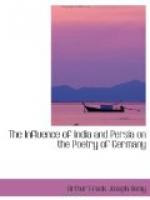As we see, most of these travellers are Italians. We know of but one German, before the year 1500, who went further than the Holy Land, and that is Johann Schildberger of Munich, whose book of travel was printed in 1473. Taken prisoner while fighting in Turkish service against Timur at Angora, he remained in the East from 1395 to 1417, and got as far as Persia. His description of that country is very meagre; India, as he expressly states,[15] he never visited, his statements about that land being mostly plagiarized from Mandeville.[16]
These accounts, however, while they give valuable information concerning the physical geography, the wealth, size, and wonderful things of the countries they describe, have little or nothing to say about the languages or literatures. All that Conti for instance has to say on this important subject is contained in a single sentence: “Loquendi idiomata sunt apud Indos plurima, atque inter se varia."[17]
In these accounts it was not so much truthfulness that appealed to the public, as strangeness and fancifulness. Thus Marco Polo’s narrative, marvelous as it was, never became as popular as the spurious memoirs of Mandeville, who in serving up his monstrosities ransacked almost every author, classic or mediaeval, on whom he could lay his hands.[18] In fact a class of books arose which bore the significant name of Mirabilia Mundi and purported to treat of the whole world, and especially of India. Such are, for instance, Les Merveilles de l’Inde by Jean Vauquelin, Fenix de las maravillas del mondo by Raymundus Lullius, and similar works by Nicolaus Donis, Arnaldus de Badeto and others.[19] But the great store-house of Oriental marvels on which the mediaeval poets drew for material was the Alexander-romance of pseudo-Callisthenes, of which there were a number of Latin versions, the most important being the epitome made by Julius Valerius and the Historia de Preliis written by the archpresbyter Leo in the tenth century. The character of the Oriental lore offered in these writings is best shown by a cursory examination of the work last mentioned.[20] There we are introduced to a bewildering array of mirabilia, snakes, hippopotami, scorpions, giant-lobsters, forest-men, bats, elephants, bearded women, dog-headed people, griffins, white women with long hair and canine teeth, fire-spouting birds, trees that grow and vanish in the course of a single day, mountains of adamant, and finally sacred sun-trees and moon-trees that possess the gift of prophecy. But beyond some vague reference to asceticism not a trace of knowledge of Brahmanic life can be found. While the Brahman King Didimus is well versed in Roman and Greek mythology, he never mentions the name of any of his own gods. Of real information concerning India there is almost nothing.
* * * * *




